七年级英语固定搭配复习过程
初中英语知识点归纳常用固定搭配
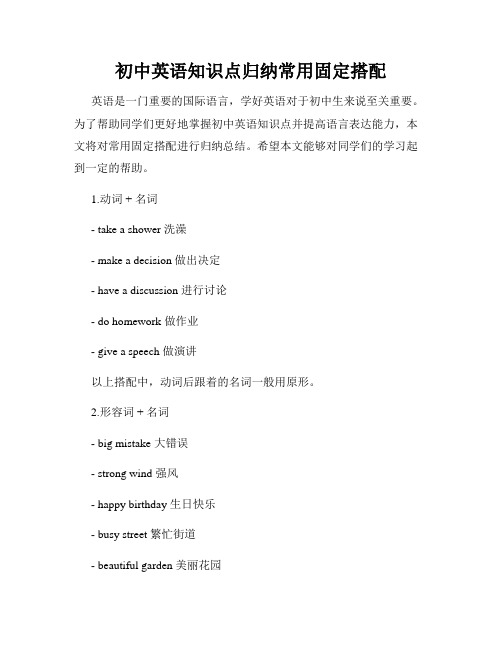
初中英语知识点归纳常用固定搭配英语是一门重要的国际语言,学好英语对于初中生来说至关重要。
为了帮助同学们更好地掌握初中英语知识点并提高语言表达能力,本文将对常用固定搭配进行归纳总结。
希望本文能够对同学们的学习起到一定的帮助。
1.动词 + 名词- take a shower 洗澡- make a decision 做出决定- have a discussion 进行讨论- do homework 做作业- give a speech 做演讲以上搭配中,动词后跟着的名词一般用原形。
2.形容词 + 名词- big mistake 大错误- strong wind 强风- happy birthday 生日快乐- busy street 繁忙街道- beautiful garden 美丽花园这些搭配中,形容词修饰名词,形容词通常在名词的前面。
3.名词 + 名词- basketball game 篮球比赛- computer science 计算机科学- summer vacation 暑假- football field 足球场- music festival 音乐节这些搭配中,第一个名词修饰第二个名词,两个名词之间用空格隔开。
4.动词 + 副词- play happily 快乐地玩耍- study hard 努力学习- eat quickly 快速吃饭- sleep soundly 睡得香- run slowly 慢跑这些搭配中,动词和副词之间没有特定的顺序,可以根据具体情况来决定。
5.介词 + 名词- in the park 在公园里- on the table 在桌子上- at school 在学校- by bus 乘公交车- with friends 和朋友们一起以上搭配中,介词后跟着的名词表示地点、位置或方式。
6.动词 + 介词短语- listen to music 听音乐- look at the picture 看图片- talk about hobbies 谈论爱好- think of a solution 想出一个解决方法- take care of 小心照料这些搭配中,介词短语修饰动词的含义,介词短语通常在动词的后面。
初中英语固定搭配快速记忆法
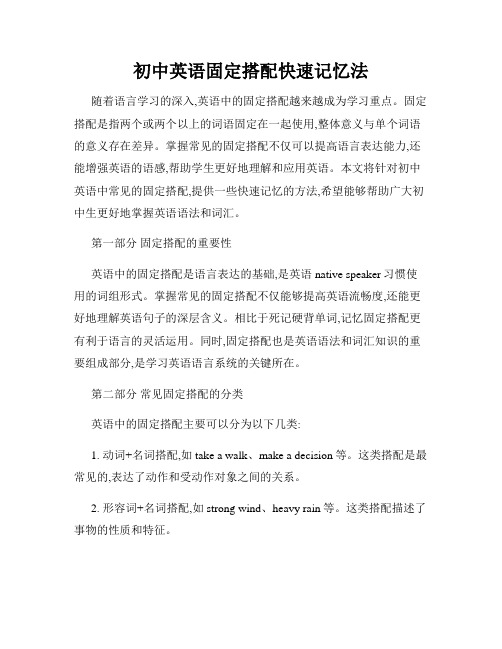
初中英语固定搭配快速记忆法随着语言学习的深入,英语中的固定搭配越来越成为学习重点。
固定搭配是指两个或两个以上的词语固定在一起使用,整体意义与单个词语的意义存在差异。
掌握常见的固定搭配不仅可以提高语言表达能力,还能增强英语的语感,帮助学生更好地理解和应用英语。
本文将针对初中英语中常见的固定搭配,提供一些快速记忆的方法,希望能够帮助广大初中生更好地掌握英语语法和词汇。
第一部分固定搭配的重要性英语中的固定搭配是语言表达的基础,是英语native speaker习惯使用的词组形式。
掌握常见的固定搭配不仅能够提高英语流畅度,还能更好地理解英语句子的深层含义。
相比于死记硬背单词,记忆固定搭配更有利于语言的灵活运用。
同时,固定搭配也是英语语法和词汇知识的重要组成部分,是学习英语语言系统的关键所在。
第二部分常见固定搭配的分类英语中的固定搭配主要可以分为以下几类:1. 动词+名词搭配,如take a walk、make a decision等。
这类搭配是最常见的,表达了动作和受动作对象之间的关系。
2. 形容词+名词搭配,如strong wind、heavy rain等。
这类搭配描述了事物的性质和特征。
3. 副词+形容词/动词搭配,如deeply impressed、strongly recommend 等。
这类搭配修饰动词或形容词,表达程度或方式。
4. 介词+名词搭配,如in the morning、on the table等。
这类搭配表达了空间、时间等关系。
5. 习语和俚语,如it's raining cats and dogs、a piece of cake等。
这类搭配意义不能由单个词汇直接推导,需要掌握其固定用法。
第三部分记忆固定搭配的方法1. 多接触、反复练习要想快速记住固定搭配,需要大量地接触和使用它们。
在学习新的固定搭配时,要反复朗读、书写,并在日常交流中尝试运用。
只有通过大量的实践,才能将固定搭配牢牢地记住。
七年级英语上册完形填空题解题步骤与技巧
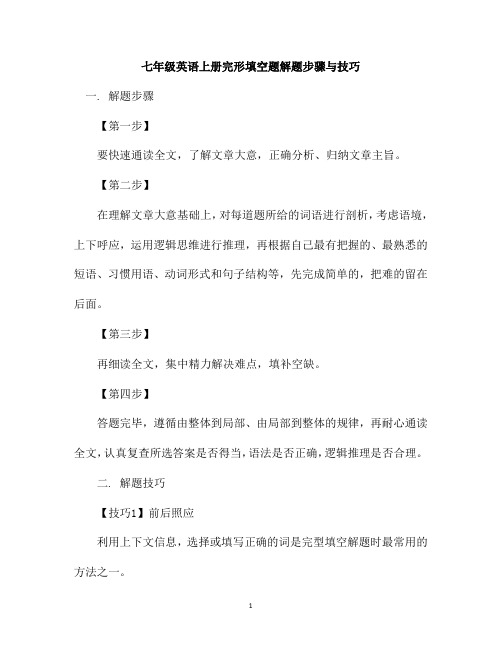
七年级英语上册完形填空题解题步骤与技巧一. 解题步骤【第一步】要快速通读全文,了解文章大意,正确分析、归纳文章主旨。
【第二步】在理解文章大意基础上,对每道题所给的词语进行剖析,考虑语境,上下呼应,运用逻辑思维进行推理,再根据自己最有把握的、最熟悉的短语、习惯用语、动词形式和句子结构等,先完成简单的,把难的留在后面。
【第三步】再细读全文,集中精力解决难点,填补空缺。
【第四步】答题完毕,遵循由整体到局部、由局部到整体的规律,再耐心通读全文,认真复查所选答案是否得当,语法是否正确,逻辑推理是否合理。
二. 解题技巧【技巧1】前后照应利用上下文信息,选择或填写正确的词是完型填空解题时最常用的方法之一。
在做四选一的完型填空时,我们有时会发现每一个选项从语法角度来讲都可以说得通,遇到这种情况,我们应细读上下文,正确答案会在上下文中得到提示。
试看以下例题:【例1】What do I remember about my childhood? There were good things and bad things. We used to live______ , and my parents always got up early in the morning to feed the cows and sheep.A. in a townB. on a farmC. on a busy streetD. in a city【解析】B 本段主要讲作者回忆儿童时代所居住的地点。
从四个选项来看都是可能的,语法上都说得通。
但通过下文my parents always got up early in the morning to feed the cows and sheep.提示我们可以知道作者生活在农村,正确答案选B。
【例2】I always remember waking up to the smell of the breakfast my mother was cooking. What a wonderful smell! I used to_______ ,wash quickly and run downstairs. My breakfast would be waiting for me on the table.A. leave the bedB.lie in bedC. jump out of bedD. get up【解析】C 本段讲每天早上妈妈煮的早餐发出诱人的香味,使得躺在床上的我立即起床。
初一上册英语固定结构复习
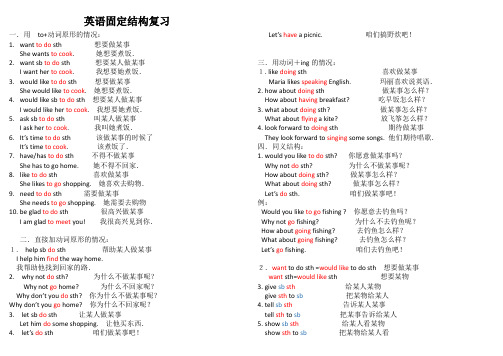
英语固定结构复习一.用to+动词原形的情况:1.want to do sth想要做某事She wants to cook.她想要煮饭.2.want sb to do sth想要某人做某事I want her to cook.我想要她煮饭.3.would like to do sth想要做某事She would like to cook.她想要煮饭.4.would like sb to do sth想要某人做某事I would like her to cook.我想要她煮饭.5.ask sb to do sth叫某人做某事I ask her to cook.我叫她煮饭.6.It’s time to do sth该做某事的时候了It’s time to cook.该煮饭了.7.have/has to do sth 不得不做某事She has to go home.她不得不回家.8.like to do sth 喜欢做某事She likes to go shopping.她喜欢去购物.9.need to do sth需要做某事She needs to go shopping.她需要去购物10.be glad to do sth 很高兴做某事I am glad to meet you!我很高兴见到你.二.直接加动词原形的情况:1. help sb do sth 帮助某人做某事I help him find the way home.我帮助他找到回家的路.2. why not do sth?为什么不做某事呢?Why not go home?为什么不回家呢?Why don’t you do sth?你为什么不做某事呢?Why don’t you go home?你为什么不回家呢?3. let sb do sth让某人做某事Let him do some shopping.让他买东西.4. let’s do sth咱们做某事吧!Let’s have a picnic.咱们搞野炊吧!三.用动词+ing的情况:1. like doing sth 喜欢做某事Maria likes speaking English.玛丽喜欢说英语.2. how about doing sth做某事怎么样?How about having breakfast?吃早饭怎么样?3. what about doing sth?做某事怎么样?What about flying a kite?放飞筝怎么样?4. look forward to doing sth期待做某事They look forward to singing some songs. 他们期待唱歌.四.同义结构:1. would you like to do sth? 你愿意做某事吗?Why not do sth?为什么不做某事呢?How about doing sth?做某事怎么样?What about doing sth?做某事怎么样?Let’s do sth.咱们做某事吧!例:Would you like to go fishing ?你愿意去钓鱼吗?Why not go fishing?为什么不去钓鱼呢?How about going fishing?去钓鱼怎么样?What about going fishing?去钓鱼怎么样?Let’s go fishing.咱们去钓鱼吧!2.want to do sth =would like to do sth 想要做某事want sth=would like sth想要某物3. give sb sth给某人某物give sth to sb 把某物给某人4. tell sb sth告诉某人某事tell sth to sb 把某事告诉给某人5. show sb sth给某人看某物show sth to sb 把某物给某人看6. teach sb sth教某人某物teach sth to sb 把某物教给某人7. buy sb sth买给某人某物buy sth for sb 为某人买某物8. help sb do sth帮助某人做某事help sb with sth 帮助某人某事I help her do her homework. 我帮助她做家庭作业.I help her with her homework.我帮助她的家庭作业.9.How do you like sth?=What do you think of sth 你认为某物怎么样?10. What is the time?=What time is it? 现在几点了?11. It’s time for(doing) sth 该(做)某事的时候了It’s time to do sth该做某事的时候了It’s time for lunch. 该午饭的时候了.It’s time to have lunch.该吃午饭的时候了.11.be free =have (some) time 有空,有时间12.be not free=don’t have (any) time=have no time 没有空,没有时间13.be in=be at home 在家14.be not in=be not at home=be out 不在家,出去了e from=be from 来自….16.look different=don’t/doesn’t look the same 看起来不一样17.thank you very much=thanks a lot 非常感谢!五.常用介词的短语搭配:at : at home 在家at school 在学校at 9:00 在九点look at sth 看某物for: have sth for breakfast/lunch/dinner 早餐/午餐/晚餐吃某物buy sth for sb 为某人买某物go for a picnic 去野炊thank sb for (doing)sth 因(做)某事感谢某人it’s time for(doing)sth 该(做)某事了in:in the morning/afternoon/evening 在上午/下午/晚上live in sp 住在某地in an office 在办公室in a hospital 在医院be in颜色/衣物穿…衣物in English/Chinese 用英语/汉语表达on:on a farm 在农场on the sofa 在沙发上on the way home 在回家的路上on one’s way home 在某人回家的路上on Sunday 在星期天try on 试穿to: be kind /good to sb 对某人友好look forward to(doing)sth期待(做)某事go to sp 去某地come to sp 来某地the way to sp 去某地的路take sth to sp 带某物去某地welcome to sp 欢迎来某地help oneself to sth 随便吃喝某物next to紧挨着,在…旁边with: do sth with sb 和某人一起做某事take sth with sb (某人)带上某物help sb with sth 帮助某人某事play with sth 玩某物like: look like… 看起来像… be like… 像… sb/sth like…像…的人/物of: A of B B的A (B中的A) a pair of…一双… a kilo of… 一公斤…one of sb/sth 某人/某物中之一some of them 他们中的一些it’s kind of sb to do sth 某人做某事真是太好了a lot of...许多的…think of… 认为/觉得…abou t: think about考虑what/how about…怎么样/如何六.疑问词/词组和疑问句。
英语七年级名词短语固定搭配
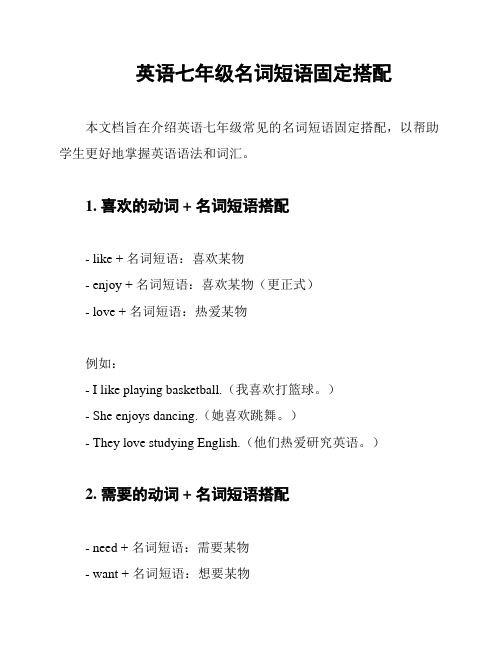
英语七年级名词短语固定搭配本文档旨在介绍英语七年级常见的名词短语固定搭配,以帮助学生更好地掌握英语语法和词汇。
1. 喜欢的动词 + 名词短语搭配- like + 名词短语:喜欢某物- enjoy + 名词短语:喜欢某物(更正式)- love + 名词短语:热爱某物例如:- I like playing basketball.(我喜欢打篮球。
)- She enjoys dancing.(她喜欢跳舞。
)- They love studying English.(他们热爱研究英语。
)2. 需要的动词 + 名词短语搭配- need + 名词短语:需要某物- want + 名词短语:想要某物- require + 名词短语:需要某物(更正式)例如:- I need a pen for writing.(我需要一支笔来写字。
)- She wants a new bike.(她想要一辆新自行车。
)- This job requires a lot of experience.(这份工作需要很多经验。
)3. 喜欢的形容词 + 名词短语搭配- happy + 名词短语:高兴的某事物- sad + 名词短语:悲伤的某事物- excited + 名词短语:兴奋的某事物例如:- They are happy to see their friends.(他们高兴地见到了他们的朋友。
)- She is sad about the bad news.(她对坏消息感到悲伤。
)4. 打算或计划的动词 + 名词短语搭配- plan + 名词短语:计划某事物- intend + 名词短语:打算某事物例如:- We plan a trip to the zoo.(我们计划去动物园。
)- She intends to study abroad.(她打算出国留学。
)以上是英语七年级常见的名词短语固定搭配。
希望这些例子能帮助学生更好地理解和运用英语语法。
初中英语知识点归纳固定搭配回顾

初中英语知识点归纳固定搭配回顾英语作为一门语言学科,具有丰富的知识点和固定搭配,对于初中学生来说,掌握这些知识点和搭配是非常重要的。
本文将对初中英语知识点和固定搭配进行归纳和回顾,帮助学生们更好地理解和掌握英语的基础知识。
一、动词的时态和语态1. 一般现在时:表示经常性或习惯性的动作,或者客观事实。
例句:She usually goes to school by bike.2. 现在进行时:表示正在进行的动作。
例句:I am reading a book at the moment.3. 一般过去时:表示过去某个时间点或一段时间的动作。
例句:He played basketball yesterday.4. 过去进行时:表示过去某个时间点正在进行的动作。
例句:They were watching a movie last night.5. 一般将来时:表示将来某个时间点或一段时间的动作。
例句:We will have a party next week.6. 情态动词:表示情态、能力和可能性等。
例句:I can swim.7. 被动语态:主语是动作的承受者。
例句:The book was written by Mark Twain.二、名词的单复数和所有格1. 名词的单数形式:例句:book, pen, cat2. 名词的复数形式:例句:books, pens, cats3. 名词的所有格:例句:Tom's book三、形容词的比较级和最高级1. 形容词的比较级:例句:big, bigger, biggest2. 形容词的最高级:例句:good, better, best四、代词的主格和宾格1. 主格代词:例句:I, you, he, she, it, we, they 2. 宾格代词:例句:me, you, him, her, it, us, them五、副词的用法1. 地点副词:例句:here, there2. 方式副词:例句:slowly, quickly3. 时间副词:例句:now, then六、连词的用法1. 并列连词:例句:and, but, or2. 从属连词:例句:because, although, while七、介词的用法1. 表示位置:例句:in, on, under2. 表示时间:例句:at, on, in3. 表示方向:例句:to, from, towards以上是初中英语的知识点和固定搭配的简要回顾。
完整英语七年级交际用语固定搭配
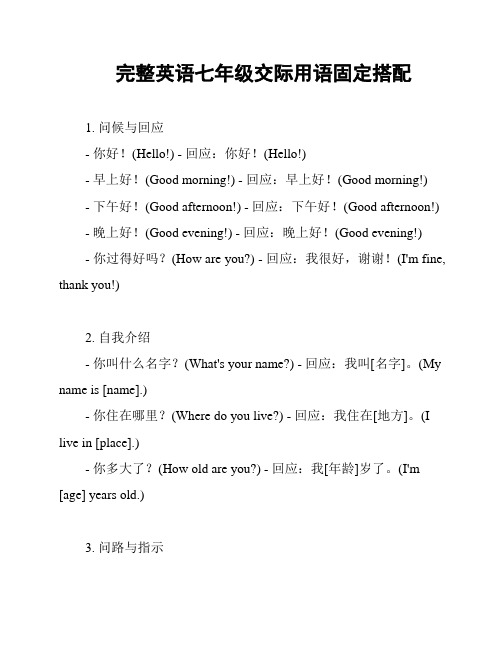
完整英语七年级交际用语固定搭配1. 问候与回应- 你好!(Hello!) - 回应:你好!(Hello!)- 早上好!(Good morning!) - 回应:早上好!(Good morning!)- 下午好!(Good afternoon!) - 回应:下午好!(Good afternoon!) - 晚上好!(Good evening!) - 回应:晚上好!(Good evening!)- 你过得好吗?(How are you?) - 回应:我很好,谢谢!(I'm fine, thank you!)2. 自我介绍- 你叫什么名字?(What's your name?) - 回应:我叫[名字]。
(My name is [name].)- 你住在哪里?(Where do you live?) - 回应:我住在[地方]。
(I live in [place].)- 你多大了?(How old are you?) - 回应:我[年龄]岁了。
(I'm [age] years old.)3. 问路与指示- 对不起,你能告诉我去[地方]的路吗?(Excuse me, can you tell me the way to [place]?) - 回应:当你走出这里,然后向左拐,一直直走,你就会找到[地方]。
(When you go out of here, turn left, go straight ahead, and you will find [place].)- 请问,[地方]离这里远吗?(Excuse me, is [place] far from here?) - 回应:不,它离这里不远。
(No, it's not far from here.)4. 预定与订单- 我想预定一张[时间]去[地方]的车票。
(I'd like to book a ticket to [place] for [time].) - 回应:好的,请等一下,我来给你处理。
义务教育初中七年级下册英语第一单元的固定搭配句型
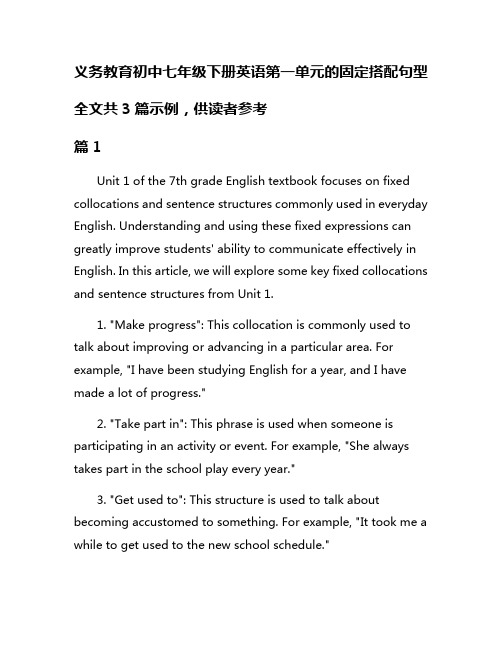
义务教育初中七年级下册英语第一单元的固定搭配句型全文共3篇示例,供读者参考篇1Unit 1 of the 7th grade English textbook focuses on fixed collocations and sentence structures commonly used in everyday English. Understanding and using these fixed expressions can greatly improve students' ability to communicate effectively in English. In this article, we will explore some key fixed collocations and sentence structures from Unit 1.1. "Make progress": This collocation is commonly used to talk about improving or advancing in a particular area. For example, "I have been studying English for a year, and I have made a lot of progress."2. "Take part in": This phrase is used when someone is participating in an activity or event. For example, "She always takes part in the school play every year."3. "Get used to": This structure is used to talk about becoming accustomed to something. For example, "It took me a while to get used to the new school schedule."4. "Look forward to": This expression is used when anticipating something with excitement or pleasure. For example, "I am looking forward to the summer vacation."5. "Be interested in": This collocation is used to talk about having an interest in something. For example, "She is very interested in learning about different cultures."6. "Be good at": This phrase is used to talk about having a talent or skill in a particular area. For example, "He is good at playing the piano."7. "Be responsible for": This structure is used to talk about being in charge of something or someone. For example, "As the team captain, he is responsible for leading the group."8. "Keep in touch": This expression is used to talk about staying connected with someone. For example, "Even though we live far apart, we always keep in touch."9. "Do research": This collocation is used when conducting a systematic investigation or study on a specific topic. For example, "She spent months doing research for her science project."10. "Take care of": This phrase is used to talk about looking after someone or something. For example, "She takes care of her younger brother after school."These fixed collocations and sentence structures are just a few examples of the many useful expressions covered in Unit 1 of the 7th grade English textbook. By practicing these expressions and incorporating them into their everyday conversations, students can enhance their English language skills and communicate more effectively in various situations.篇2Unit 1 of Grade 7 in the lower semester of compulsory education is an important foundation for students to build their English language skills. In this unit, students will learn a variety of fixed collocations and sentence structures that are commonly used in English. These fixed expressions play a crucial role in helping students express themselves fluently and effectively in both written and spoken English. Below are some examples of fixed collocations and sentence structures from Unit 1:1. Make a decision: Students will learn how to use this collocation to talk about making choices or reaching a conclusion. For example, "I need to make a decision about which college to attend."2. Take a break: This fixed expression is used to talk about resting for a short period of time. For example, "Let's take a break and have some snacks."3. Keep in touch: This collocation is commonly used to talk about staying connected with someone. For example, "Let's exchange numbers so we can keep in touch."4. Look up: Students will learn to use this phrasal verb to talk about finding information in a dictionary or on the internet. For example, "I had to look up the meaning of that word in the dictionary."5. Fall in love: This fixed expression is used to talk about developing romantic feelings for someone. For example, "They fell in love while studying abroad."6. Have a good time: Students will learn to use this expression to talk about enjoying themselves. For example, "We had a good time at the party last night."7. Get to know: This collocation is used to talk about becoming familiar with someone or something. For example, "I got to know my new classmates during orientation."8. Make a mistake: Students will learn to use this collocation to talk about doing something wrong. For example, "I made a mistake on the math quiz."These fixed collocations and expressions are just a few examples of the many language patterns that students will encounter in Unit 1. By mastering these collocations and sentence structures, students will be better equipped to communicate effectively in English. It is important for students to practice using these fixed expressions in both written and spoken English in order to improve their language skills.篇3Unit 1 of the seventh grade English textbook in compulsory education focuses on fixed collocations and sentence structures. Here are some examples of fixed collocation sentence structures that students will encounter in this unit:1. Make a decision: Students will learn how to use this fixed collocation to express making choices or selecting options. For example, "I need to make a decision about which extracurricular activity to join."2. Keep in touch: This fixed collocation is used to signify staying in contact or maintaining communication with someone.For instance, "I always keep in touch with my best friend from elementary school."3. Give someone a hand: This fixed collocation is used when offering assistance or help to someone. For example, "I'll give you a hand with your homework after school."4. Reach a decision: This fixed collocation is similar to "makea decision" and is used to indicate coming to a conclusion or making a choice. For instance, "After much deliberation, we finally reached a decision on where to go for vacation."5. Take an interest in: This fixed collocation is used to express developing an interest in a particular hobby, activity, or subject. For example, "She has recently taken an interest in learning how to play the guitar."6. Keep an eye on: This fixed collocation is used to indicate paying attention to someone or something, usually for surveillance or safety reasons. For instance, "I always keep an eye on my younger brother when we're at the park."7. Take part in: This fixed collocation is used to express participating or joining an event, activity, or group. For example, "She decided to take part in the school talent show this year."8. Pay attention to: This fixed collocation is used to indicate focusing on or concentrating on a particular person or thing. For instance, "It's important to pay attention to the teacher during class."9. Make an effort: This fixed collocation is used to express trying hard or putting in work to achieve a goal or complete a task. For example, "I always make an effort to finish my homework on time."10. Have a chat: This fixed collocation is used to indicate having a casual conversation with someone. For instance, "Let's have a chat over coffee."These fixed collocations and sentence structures are essential for students to understand and use in order to improve their English proficiency. By practicing these collocations in context, students can develop their language skills and communicate more effectively in English.。
初一固定搭配归纳总结上册

初一固定搭配归纳总结上册初一英语中,学习固定搭配是非常重要的一部分。
这些固定搭配能够帮助我们更准确地理解和表达自己的意思。
在上册学习中,我们遇到了很多有用的固定搭配。
本文将对这些固定搭配进行归纳总结,以便我们能够更好地掌握和运用它们。
一、动词搭配1. take a walk: 散步e.g. I like to take a walk in the park after dinner.2. have a good time: 玩得开心e.g. We had a good time at the party last night.3. make a decision: 做决定e.g. It's time to make a decision about which college to attend.4. give a speech: 发表演讲e.g. The president will give a speech at the conference.5. do housework: 做家务e.g. My sister helps my mom do housework every Saturday.二、名词搭配1. a piece of paper: 一张纸e.g. Can you give me a piece of paper to write on?2. a cup of tea: 一杯茶e.g. I would like to have a cup of tea, please.3. a lot of: 很多e.g. There were a lot of people at the concert.4. a pair of shoes: 一双鞋子e.g. I bought a new pair of shoes for the party.5. a bottle of water: 一瓶水e.g. Don't forget to bring a bottle of water with you to the park.三、形容词搭配1. be interested in: 对...感兴趣e.g. I am interested in learning how to play the guitar.2. be good at: 擅长e.g. She is good at playing basketball.3. be afraid of: 害怕e.g. I am afraid of spiders.4. be happy with: 对...满意,喜欢e.g. I am happy with my new haircut.5. be proud of: 为...感到骄傲e.g. My parents are proud of my achievements.四、副词搭配1. in the morning: 在早上e.g. I usually exercise in the morning.2. at night: 在晚上e.g. I like to read books at night before bed.3. on the weekend: 在周末e.g. I often go hiking on the weekend.4. in the afternoon: 在下午e.g. We have English class in the afternoon.5. at the moment: 此刻e.g. I'm busy at the moment. Can I call you back later?通过对上述固定搭配的归纳总结,我们可以更好地记忆和运用这些固定搭配。
七年级第2学期英语复习 固定搭配
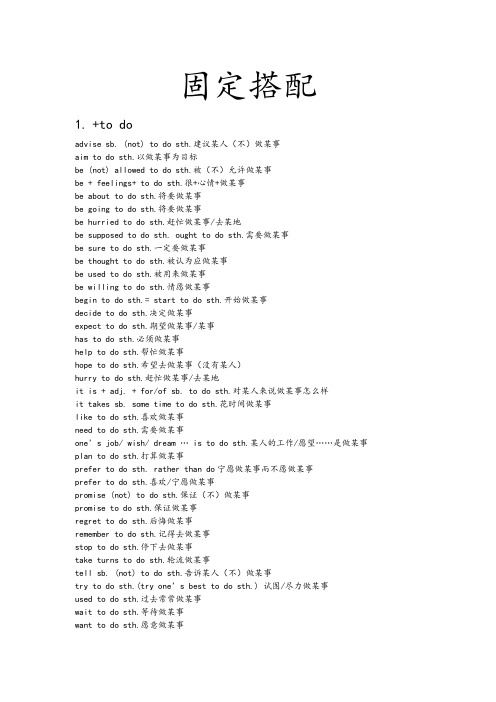
固定搭配1.+to doadvise sb. (not) to do sth.建议某人(不)做某事aim to do sth.以做某事为目标be (not) allowed to do sth.被(不)允许做某事be + feelings+ to do sth.很+心情+做某事be about to do sth.将要做某事be going to do sth.将要做某事be hurried to do sth.赶忙做某事/去某地be supposed to do sth. ought to do sth.需要做某事be sure to do sth.一定要做某事be thought to do sth.被认为应做某事be used to do sth.被用来做某事be willing to do sth.情愿做某事begin to do sth.= start to do sth.开始做某事decide to do sth.决定做某事expect to do sth.期望做某事/某事has to do sth.必须做某事help to do sth.帮忙做某事hope to do sth.希望去做某事(没有某人)hurry to do sth.赶忙做某事/去某地it is + adj. + for/of sb. to do sth.对某人来说做某事怎么样it takes sb. some time to do sth.花时间做某事like to do sth.喜欢做某事need to do sth.需要做某事one’s job/ wish/ dream … is to do sth.某人的工作/愿望……是做某事plan to do sth.打算做某事prefer to do sth. rather than do宁愿做某事而不愿做某事prefer to do sth.喜欢/宁愿做某事promise (not) to do sth.保证(不)做某事promise to do sth.保证做某事regret to do sth.后悔做某事remember to do sth.记得去做某事stop to do sth.停下去做某事take turns to do sth.轮流做某事tell sb. (not) to do sth.告诉某人(不)做某事try to do sth.(try one’s best to do sth.) 试图/尽力做某事used to do sth.过去常常做某事wait to do sth.等待做某事want to do sth.愿意做某事would like to do sth.愿意做某事2.+doingbe busy doing sth. 忙于做某事dislike doing sth.不喜欢做某事enjoy doing sth. like doing sth.享受/喜欢做某事feel like sth./ doing sth. 愿意做某事finish doing sth.结束做某事forget doing sth.忘记做过了某事have trouble doing sth.做某事有麻烦mind doing sth.介意做某事one’s hobby is doing sth.某人的兴趣是做某事practice doing sth.练习做某事remember doing sth.记得做过了某事sp.end some time doing sth.花时间做某事stop doing sth.停止做某事try doing sth.尝试做某事3.+to doingbe/get used to doing习惯于做某事look forward to doing sth.期望做某事/某事prefer doing A to doing B喜欢做A胜过做B4.+sentencehope that sb. will/can do sth.希望某人会/能做某事suggest (that) sb. (should) (not) do sth. 建议某人(不)做某事5.+others(sth.) cost sb. some money (某物)花了某人多少钱(would) prefer to do A rather than do B 想要做A也不要做Badd A to B 把A加到B中apologize to sb. for sth./ doing sth. 因某事和某人道歉apply for sth. 申请某物argue with sb. about/ over sth.与某人争论某事arrive in/ at sp. get to sp. reach sp. 到达某地arrive on time for sth. 为某事准时到达attach A to B 把A附在B上be (most feelings) with sb. at/ about sth. 因某事对某人感到(大多数心情)be absent from sth. 在某事缺席be attracted by sth. be fascinated by sth. 被某事吸引be bad for sth./sb. 对某事/某人有害be bored with sth. 无聊做某事be busy with sth. 忙于做某事be cruel to sb. be unkind to sb. 对某人不好be different from sth./ sb. 与某物/某人不同be equipped with sth. 配备某物be full of sth. 充满某物be fully prepared for sth. 为某事做充分的准备be good/ poor at sth./ doing sth. 某事/做某事很好/差be harmful to sth./sb.对某人/某物有害be important/ sp.ecial/ … to sb. 对某人来说很重要/特别be in the way to sp. 在去某地的路上be keen on sth.对某事热衷be late for sth. 没赶上/迟到了某事be made from sth. 被某物制成(看不出材料)be made of sth. 被某物制成(看得出材料)be not on time for sth.不按时做某事be occupied with sth.忙于做某事be on time for sth. be not late for sth. 准时赶上某事be popular with sb. 受到某人的欢迎be sick/ tired of sth./ doing sth. 腻于/疲于做某事be similar to sth./ sb. 与某物/某人相似be sorry for sth. 为某事感到抱歉be thankful/ grateful to sb. for sth./ doing sth.感谢某人做了某事be/ get interested in sth. 对某事感兴趣believe in sth./ sb. 相信某事/某人的存在;信赖某人believe sth./ sb. 相信某事/某人borrow sth. from sb. 问某人借某物buy sth. from a channel 在电视频道上买东西call from sp. 从某地打电话来care about sth. 在乎/关心某事care for sth./ sb. 喜欢某物/照顾某人clear A from B 把A从B上清走communicate with sb. 和某人沟通compare A to B 把A比作Bcompare A with B 把A和B比较complain about doing sth. 抱怨做某事compliment about/ on sth./ sb. 夸赞某人/某物compliment sb. on sth. 因某事对某人夸赞contribute to sth. make contributions to sth. 为某事做出贡献deliver sth. to sp. 运送某物到某地develop an interest in sth.对某事产生兴趣differ from sth./ sb. in sth. 在某方面与某物/某人不同do A before/ after sb. do B在某人做B之前/之后做Ado A by doing B 通过做B事来做A事do a favor for sb. do sb. a favor 帮某人忙do business with sb. 和某人做生意do harm to sth./sb.对某人/某物有害do sth. accidentally do sth. by accident 意外地做某事do sth. for help 做某事求救do sth. for sth./ sb. 为某事/某人做某事do sth. hurriedly赶紧做某事do sth. in a hurry赶紧做某事do sth. in person 亲自做某事do sth. no more不再做某事do sth./ go sp. hurriedly赶忙做某事/去某地do well/ poorly in sth./ doing sth.在某事上做得好/差express o ne’s gratitude to sb. for sth./ doing sth.对某人做某事表示感谢fill in/ out sth. 填写某物forget sth. leave sth. at home 忘带某物get into the habit of doing sth. 养成习惯做某事get together with sb. 和某人相聚give sb. a recommendation about sth.向某人推荐某物give sb. sth. as a present for one’s anniversary/ birthday/ …给某人某物作为纪念日/生日礼物go sp. for breakfast/ lunch/ dinner 去某地吃早/中/晚饭greet sb. say “hello” to sb. 问候某人had better do sth. 最好做某事have a (big) argument with sb. about/ over sth. 因某事和某人吵架have a conversation with sb. 和某人谈话have a meeting with sb. 和某人开会have a(n) (big) argument with sb. about/ over sth. 因某事和某人吵架have problems with sth. (身体)某处不舒服have sth. in common with sb.= share the same sth. with sb. 和某人有共同点have trouble in doing sth. 做某事有麻烦have/show interest in sth.对某事有兴趣hear from sb. get/ receive a letter from sb. 收到某人的来信help sb. with sth. 在某事上帮某人keep sth. + adj. 保持某物怎么样leave A for B 离开A去Bleave for sp. 离开去某地leave sp. 离开某地let sb. (not) do sth. 让某人(不)做某事like A better than B / like doing A better than doing B 喜欢A/做A胜过B/做B live far apart life far from each other 住得相距很远look after sb.照顾某人make A into B 把A做成Bmake a recommendation about sth. to sb.向某人推荐某物make a reservation of sth. 做某事的预约make an appointment with sb. make an one’s appointment 和某人预约make full preparations for sth.为某事做充分准备make sb. (not) do sth. 让某人(不)做某事make use of sth. 利用某物marry sb. get married to sb. 和某人结婚miss sth.错过了某事move to sp. 搬到某地name sb. sth. 以某名字命名某人no longer do sth. 不再做某事not do sth. any longeroffer sb. sth.把某物提供给某人offer sth. to sb. 把某物提供给某人order sth. for / dessert 甜点点某物order sth. for an appetizer 前菜点某物order sth. for the main course 主食点某物order sth. from sb./ sp. 从某人/某处订购某物pay respect to sth./ sb. 尊重某物/某人pay sb. some money for sth. 为某物付钱给某人pour A into B 把A(液体)倒到B里prepare for sth. 准备某事present sth. to sb. 给某人展示某事prevent sb. from (not) doing sth. 阻止某人(不)做某事provide sb. with sth.给某人提供某物put A into B把A(固体)放进B里recommend sb. sth.给某人推荐某物relate to sth.= be related to sth. 和某事有关respect sth./ sb. pay respect to sth./ sb. 尊重某物/某人rush out of sp. 冲出某地rush to sp.say sorry to sb. for sth./ doing sth.see sb. do sth. 看到某人做某事(看到整个过程,或经常看见)see sb. doing sth. 看到某人做某事(看到一个瞬间)send sb. messages/ write sb. letters about sth. 给某人发/寄关于某事的消息/信share with sb. sth. share sth. with sb. 和某人分享某物shout at sb. 骂某人shout to sb. 对某人大叫spend time/ some money on sth. 在某物上花时间/钱sprinkle A with B sprinkle B on A 在A上撒Bspend some money on sth.suggest (that) sb. [subject] (should) (not) do sth. 建议某人(不)做某事take care of sb.照顾好某人talk about sth. 谈论某事teach oneself sth. 自学某事tease sb. for doing sth. 因某事嘲笑某人tell sb. about sth. 告诉某人某事tell the difference between A and B 区分A和Bthank sb. for sth./ doing sth. 因某事/做某事感谢某人think about sth./ sb. 考虑到某事/某人;想起某事/某人(持续)think of st/ sb. 想到某事/某人(瞬间)use sth. for doing sth. 用某物做某事want sth.想要某物want to know sth. wonder about sth.想知道某事would rather do A than do B 宁愿做A也不要做Bwould rather do sth. 宁愿做某事write sth. in duplicate 写某物一式两份write to sb. 写信给某人给某人某物作为纪念日/生日礼物double objecta) TObring/ give/ lend/ sell /send/ show/ offer/ … sth. to sb. bring/ give/ lend/ sell /send/ show/ offer/… sb. sth.把某物带给/送给/借给/卖给/寄给/展示给/提供给某人E.g. He brought an apple to me. He brought me an apple.b) FORbuy/ do/ get/ make/ prepare sth. for sb.buy/ do/ get/ make/ prepare sb. sth.为某人买/作/得到/制作/准备某事(某物)E.g. Would you do a favor for me? Would you do me a favor?。
根据最新英语人教版七年级上册副词固定搭配用法总结
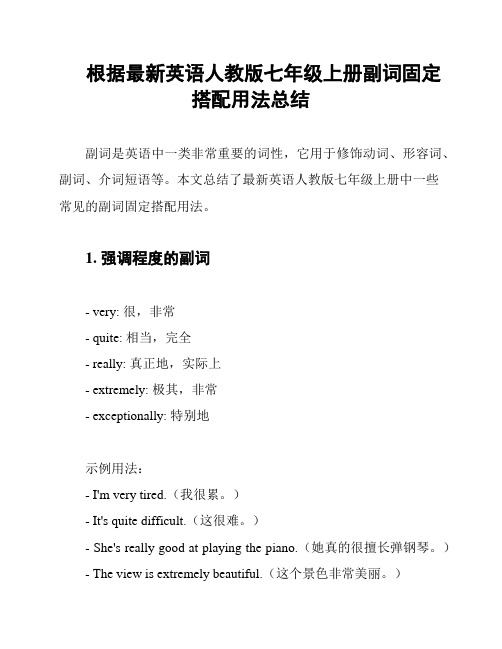
根据最新英语人教版七年级上册副词固定搭配用法总结副词是英语中一类非常重要的词性,它用于修饰动词、形容词、副词、介词短语等。
本文总结了最新英语人教版七年级上册中一些常见的副词固定搭配用法。
1. 强调程度的副词- very: 很,非常- quite: 相当,完全- really: 真正地,实际上- extremely: 极其,非常- exceptionally: 特别地示例用法:- I'm very tired.(我很累。
)- It's quite difficult.(这很难。
)- She's really good at playing the piano.(她真的很擅长弹钢琴。
)- The view is extremely beautiful.(这个景色非常美丽。
)- He is exceptionally tall.(他特别高。
)2. 表示时间的副词- always: 总是- sometimes: 有时候- often: 经常- rarely: 很少,罕见地- never: 从不示例用法:- She always gets up early.(她总是早起。
)- I sometimes go to the park.(我有时去公园。
)- They often play basketball together.(他们经常一起打篮球。
)- He rarely eats fast food.(他很少吃快餐。
)- I never drink coffee.(我从不喝咖啡。
)3. 表示地点的副词- here: 这里- there: 那里- everywhere: 到处,无处不在- somewhere: 某处,某地- nowhere: 无处,哪里都不示例用法:- Put it there.(放在那里。
)- I can see flowers everywhere.(我到处都能看到花。
七年级下册英语固定搭配必备

七年级下册英语固定搭配必备摘要:一、引言二、固定搭配的重要性1.提高语言表达的准确性和地道性2.增加语言美感3.有助于听力、口语、阅读和写作的全面提升三、七年级下册英语固定搭配清单1.动词搭配a.动词+副词b.动词+介词c.动词+连词2.形容词搭配a.形容词+副词b.形容词+介词c.形容词+连词3.副词搭配a.副词+动词b.副词+形容词c.副词+副词4.介词搭配a.介词+名词b.介词+动词c.介词+形容词5.连词搭配a.连词+名词b.连词+动词c.连词+形容词四、固定搭配的记忆方法1.分类记忆2.创设语境,实践运用3.制作记忆卡片4.定期复习五、结论正文:一、引言在学习英语的过程中,我们会接触到大量的固定搭配,这些搭配是英语表达的基础。
掌握这些搭配,对我们的听力、口语、阅读和写作都有很大的帮助。
因此,在这里特别整理了七年级下册英语固定搭配,以帮助同学们更好地学习英语。
二、固定搭配的重要性1.提高语言表达的准确性和地道性:固定搭配是英语中经过长时间使用而形成的固定表达方式,使用这些搭配可以使我们的表达更加准确、地道。
2.增加语言美感:一些固定搭配具有很强的节奏感和韵律感,使语言更加优美。
3.有助于听力、口语、阅读和写作的全面提升:掌握这些搭配,有助于我们在各种语言技能中更好地运用英语。
三、七年级下册英语固定搭配清单1.动词搭配a.动词+副词:如speak loudly(大声说话)、run quickly(跑得快)b.动词+介词:如look for(寻找)、wait for(等待)c.动词+连词:如go on(继续)、come up(出现)2.形容词搭配a.形容词+副词:如quickly(快速地)、carefully(小心地)b.形容词+介词:如happy(快乐地)、sad(悲伤地)c.形容词+连词:如taller(更高的)、younger(更年轻的)3.副词搭配a.副词+动词:如study hard(努力学习)、write carefully(认真书写)b.副词+形容词:如very beautiful(非常美丽)、extremely interesting(非常有趣)c.副词+副词:如very loudly(非常大声)、extremely quietly(非常安静)4.介词搭配a.介词+名词:如in the library(在图书馆)、on the playground(在操场上)b.介词+动词:如look for(寻找)、wait for(等待)c.介词+形容词:如upstairs(在上层)、downstairs(在楼下)5.连词搭配a.连词+名词:如a book and a pen(一本书和一支笔)b.连词+动词:如hear and see(听见和看见)c.连词+形容词:如bigger and better(更大更好的)四、固定搭配的记忆方法1.分类记忆:将固定搭配按照类别进行整理,如时间、地点、人物等,有利于记忆。
英语七年级上册固定搭配总结(最终5篇)

英语七年级上册固定搭配总结(最终5篇)第一篇:英语七年级上册固定搭配总结英语七年级上册固定搭配总结Unit 1 st /family name 姓2.first /given name 名字 3.middle school 中学;初中 4.T elephone number 电话号码 5.Good afternoon!下午好!6.Full name 全名Unit 2 1.family tree 家谱2.Have a good day!过得愉快3.The family photo /the photo of family 一张家庭照片4.I see.我明白了5.In the next photo 在下一张照片里6.There be sth.+ 介短某地有某物7.My school’s name 我学校的名字Unit 3 1.excuse me 劳驾;请原谅2.Thank you /thanks for...对...表示感谢3.You’re welcome./That’s OK./That’s all right.别客气。
4.Shool ID card 学生证5.Ask...for...请求;恳求6.A set of 一套;一组;一副7.Thank you for your help.谢谢你的帮助。
8.In the school library 在学校图书馆里 9.Ask sb.for sth 向某人求助10.E-mail sb.at...发电子邮件给某人 11.Call sb.at...打电话给某人st and Found(case).失物招领Unit 4第二篇:英语固定搭配总结一: adapt v.适应于, 改编1:Adapt to 适应: The children are finding it hard to adapt to their new school.2:Adapt for 为.....改装:The car’s fuel system was adapted for use with older children.3:be well adapted to 很好地适应:This kind of flower are well adapted to the winter.二: add v.增加;补充1:add A to B 把A加到B上:If you add 5 to 5, you get 10.2:A add toB A加到B上: five added to five is/makes 10.3:add to 增加,增添:: The balloons add to the festival atmosphere.4:add up to 加起来总共:His whole school education added up to no more than 1 year.5:add up 加起来总共: Add up the numbers, and you will get 1155.三:admit v.承认,供认1:admit(to)doing sth承认做A quarter of all workers admit to taking off when they are not ill.2:admit sb to/into 允许进入:Only ticket-holders will be admitted into the stadium.3:Come on , admit it!来吧,快点承认.4:I must admit I didn’t actually do anything to help her.我必须承认。
七年级英语固定搭配听写
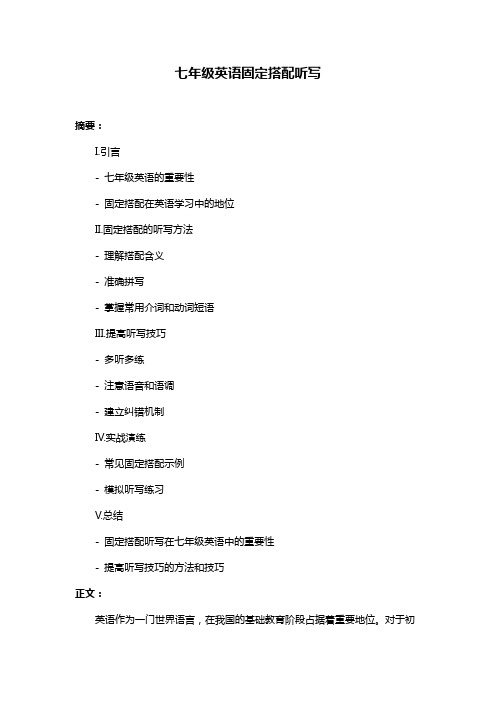
七年级英语固定搭配听写摘要:I.引言- 七年级英语的重要性- 固定搭配在英语学习中的地位II.固定搭配的听写方法- 理解搭配含义- 准确拼写- 掌握常用介词和动词短语III.提高听写技巧- 多听多练- 注意语音和语调- 建立纠错机制IV.实战演练- 常见固定搭配示例- 模拟听写练习V.总结- 固定搭配听写在七年级英语中的重要性- 提高听写技巧的方法和技巧正文:英语作为一门世界语言,在我国的基础教育阶段占据着重要地位。
对于初中生来说,七年级是英语学习的起点,因此,掌握好七年级的英语知识对今后的学习有着至关重要的影响。
在七年级英语的学习过程中,固定搭配的听写是一个重要的环节。
固定搭配是指在英语中,一些特定的词或短语按照一定的语法规则和习惯搭配在一起,具有固定的形式和意义。
在英语写作和口语表达中,固定搭配的正确使用可以使句子更加地道、流畅。
因此,对于七年级的学生来说,掌握一定数量的固定搭配,并能在听写过程中准确地将其写出来,是提高英语水平的关键。
那么,如何进行固定搭配的听写呢?首先,学生需要理解搭配的含义,了解它们在句子中的作用。
例如,“look forward to”表示“期待”,“take part in”表示“参加”,等等。
理解了搭配的含义,学生在听写时就能迅速地捕捉到这些短语,并正确地将其写出来。
其次,学生要准确地拼写这些固定搭配。
这就需要学生在平时的学习中多加练习,熟记各种搭配的拼写。
此外,学生还可以运用一些技巧,如将搭配拆分成几个部分,分别记忆,以提高记忆效果。
再者,学生需要掌握一些常用的介词和动词短语。
这些短语在英语中非常常见,掌握它们有助于提高学生的听写速度和准确率。
例如,“on the one hand”表示“一方面”,“on the other hand”表示“另一方面”,等等。
提高固定搭配听写技巧的方法有很多。
首先,学生要多听多练,通过收听英语广播、观看英语电影等方式,增加接触英语的机会。
初中英语知识点归纳固定搭配梳理
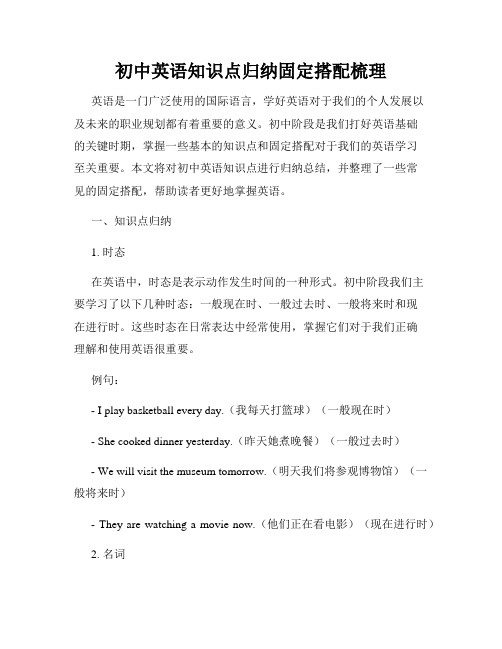
初中英语知识点归纳固定搭配梳理英语是一门广泛使用的国际语言,学好英语对于我们的个人发展以及未来的职业规划都有着重要的意义。
初中阶段是我们打好英语基础的关键时期,掌握一些基本的知识点和固定搭配对于我们的英语学习至关重要。
本文将对初中英语知识点进行归纳总结,并整理了一些常见的固定搭配,帮助读者更好地掌握英语。
一、知识点归纳1. 时态在英语中,时态是表示动作发生时间的一种形式。
初中阶段我们主要学习了以下几种时态:一般现在时、一般过去时、一般将来时和现在进行时。
这些时态在日常表达中经常使用,掌握它们对于我们正确理解和使用英语很重要。
例句:- I play basketball every day.(我每天打篮球)(一般现在时)- She cooked dinner yesterday.(昨天她煮晚餐)(一般过去时)- We will visit the museum tomorrow.(明天我们将参观博物馆)(一般将来时)- They are watching a movie now.(他们正在看电影)(现在进行时)2. 名词名词是英语中表示人、事物、地点等概念的词语。
在初中阶段,我们学习了可数名词和不可数名词的区分,以及名词的单数和复数形式等知识点。
例句:- I have two cats.(我有两只猫)(可数名词)- Can you pass me some water?(你能给我一些水吗?)(不可数名词)3. 动词动词是英语中表示行为或状态的词语。
在初中阶段,我们学习了动词的基本形式、过去式和过去分词形式,以及动词的时态和语态等知识点。
例句:- He runs every morning.(他每天早上跑步)(动词的基本形式)- She ate an apple for breakfast.(她早餐吃了一个苹果)(动词的过去式)- The book has been read by many students.(这本书已经被很多学生阅读过了)(动词的过去分词形式)4. 形容词与副词形容词用来描述名词的性质或特征,副词则用来修饰动词、形容词或其他副词。
初中常见固定短语搭配学习方法

初中常见固定短语搭配学习方法在学习英语的过程中,固定短语搭配是一个非常重要的知识点。
固定短语搭配是英语中非常常见的一种表达方式,我们在学习中要多加注意和积累。
接下来,我们将介绍一些初中常见的固定短语搭配学习方法。
1. 通过阅读积累阅读是学习固定短语的重要途径之一。
通过大量的阅读可以积累各种固定短语的用法,同时也可以了解到这些搭配在实际语境中的运用。
在阅读过程中,可以将碰到的固定搭配记录下来,然后进行总结和归纳,这样能够更好地掌握这些固定搭配的使用方法。
2. 语境和实践运用在学习固定搭配时,重要的一点是要理解这些固定搭配在不同的语境下的实际运用。
通过大量的练习和实践,可以更好地掌握这些搭配的使用方法。
比如在口语和书面语中,固定搭配的使用方式会有一定的差异,需要通过实际的练习来更好地掌握。
3. 制定学习计划学习固定短语搭配需要有一个系统的学习计划,可以将不同的固定搭配进行分类,然后逐一进行学习。
通过有条理的学习计划,可以更好地掌握和记忆这些固定搭配,同时也可以更好地监督自己的学习进度。
4. 多角度学习在学习固定短语搭配时,需要多角度进行学习,不仅要注意搭配的固定性,还要注意搭配中的词性、用法和语境。
这样可以更全面地理解这些搭配的使用方法,避免对固定搭配的错误理解。
5. 及时总结和复习在学习过程中,需要及时总结和复习所学的固定短语搭配,可以通过制作知识卡片或者笔记来加深记忆。
及时的反复复习可以帮助我们更牢固地掌握这些搭配,避免遗忘。
以上就是初中常见固定短语搭配学习方法的简要介绍。
希望同学们在学习英语的过程中能够多加注意和积累,提高固定搭配的掌握能力,从而更流利地运用英语。
初中英语固定搭配速成攻略

初中英语固定搭配速成攻略英语作为一门国际通用语言,在初中阶段的学习中极为重要。
随着英语的发展和应用范围的不断扩大,熟练掌握英语固定搭配已经成为了提高英语水平的关键所在。
初中英语学习中,掌握大量的固定搭配不仅能够提高学生的词汇量,还能有效提高学生的语言表达能力和语感。
针对初中生英语学习中的这一痛点,笔者总结了以下几点初中英语固定搭配速成攻略,希望能够给广大初中生的英语学习提供一些有价值的建议。
一、认知固定搭配的重要性固定搭配是由两个或两个以上单词组成的相对固定的词组,具有整体意义,不能任意替换单词。
它是语言表达中不可或缺的重要部分,既丰富了语言的表述,又提高了语言的准确性。
初中生在英语学习中,如果能够熟练掌握常见的固定搭配,不仅能够快速提高词汇量,还能够在日常交流和写作中运用自如,大大提高英语表达的流畅度和准确性。
因此,初中生务必要重视英语固定搭配的学习和积累。
二、系统掌握常见固定搭配初中英语固定搭配的学习应该遵循由易到难、由简单到复杂的原则,有针对性地进行学习积累。
首先,学生应该系统地掌握一些常见的固定搭配,如时间、地点、方向、数字等方面的固定搭配,如"at night"、"on the left"、"in the morning"等。
这些基础固定搭配的学习为后续的学习奠定了基础。
其次,学生还应该掌握一些常见的动词固定搭配,如"take a bath"、"make a decision"等。
再次,学生还需要重点学习一些表达感情、评价等方面的固定搭配,如"I'm sorry"、"well done"等。
通过有针对性地学习这些常见的固定搭配,学生可以逐步积累英语词汇量,提高英语表达能力。
三、运用多种方法灵活学习初中生在学习英语固定搭配时,可以运用多种方法进行灵活学习。
初中英语总复习——动词固定搭配(do,todo,doing)
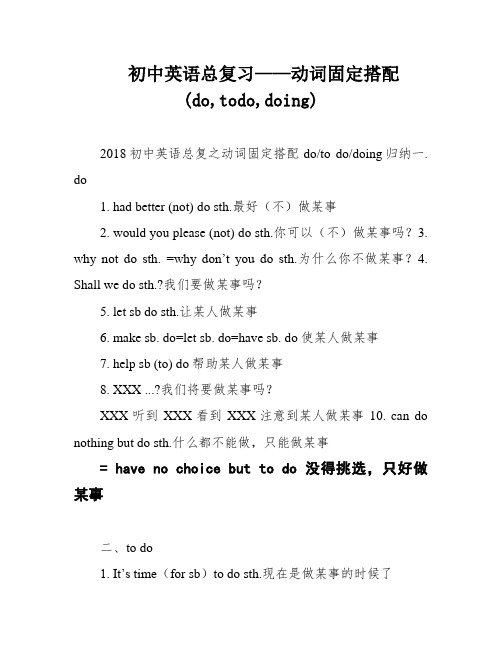
初中英语总复习——动词固定搭配(do,todo,doing)2018初中英语总复之动词固定搭配do/to do/doing归纳一. do1. had better (not) do sth.最好(不)做某事2. would you please (not) do sth.你可以(不)做某事吗?3. why not do sth. =why don’t you do sth.为什么你不做某事?4. Shall we do sth.?我们要做某事吗?5. let sb do sth.让某人做某事6. make sb. do=let sb. do=have sb. do使某人做某事7. help sb (to) do帮助某人做某事8. XXX ...?我们将要做某事吗?XXX听到XXX看到XXX注意到某人做某事10. can do nothing but do sth.什么都不能做,只能做某事= have no choice but to do没得挑选,只好做某事二、to do1. It’s time(for sb)to do sth.现在是做某事的时候了2. It XXX sb. some time to do sth.做某事花了或人时间3. XXX.假装做某事XXX.足够+形容词做某事5. It’s+adj.+ for sb. to do sth.It’seasy for you to finish your work.6. It’s+adj.+ of sb. to do sth.It’s kind of you to help me.7. prefer to do XXX.更喜欢做某事prefer doing A to doing B与做B事相比,宁肯做A事prefer to do A. rather than do B.宁愿做某事而不愿做某事would rather do A than do B与做B事相比,宁肯做A事8. how/ when/where/whether to do sth疑问词+动词不定式9. wait for sb to do期待或人做某事can’t wait to do迫在眉睫做某事10. too…to do…太怎样而不克不及做某事11. XXX do害怕、准备、能够、确定做某事12. seem to do似乎做某事13.动词+ sb. + to do sth.(否认:动词+ sb. + not to do sth.)ask / tell sb. to do sth.让或人做某事XXX.勉励或人做某事allow sb. to do sth.答应或人做某事need sb. to do sth.需求或人做某事XXX.期盼或人做没啥事XXX.告诫或人做某事XXX.约请或人做某事order sb. to do sth.敕令或人做某事XXX提示或人做某事XXX发起或人做某事XXX sb. to do sth.教或人做某事would like sb. to do sth. = want sb. to do sth.想要或人做某事XXX.但愿或人做某事出格提示:不克不及说hope sb to do14.动词+ to do sth.agree to do XXX.赞成做某事learn to do sth.进修做某事XXX.更喜爱做某事plan to do sth.打算做某事decide to do sth.决意做某事choose to do sth.挑选做某事would like to do sth. = want to do sth.想要做某事XXX.似乎做某事fail to do sth.做某事失败promise to do sth.承诺做某事XXX.负担的起做某事choose to do sth.选择做某事offer to do XXX.主动做某事refuse to do sth.拒绝做某事prepare to do sth.准备做某事XXX(碰巧)/ to do碰巧做某事need to do需要做某事XXX.希望做某事特别提醒:不能说hope sb to do15. try one's best to do尽某人最大力量做某事16. There is no need to do.没有必要做某事17. first to do第一做某事the best way to do XXX做某事的最好办法18. be made to do被迫使做某事(用于被动语态,主动语态make sb. do sth.)19. be XXX do (用于被动语态)20. manage to do sth.“(想法)做成某事”,它含有“胜利;办成”的意思21. try to do sth.“试图做某事”22. get ready to do准备要去做某事23. be sure to do当然做某事三、doing1. carry on/keep doing坚持做某事2. practise doing sth.练做某事3. keep sb. doing使某人一直做某事4. XXX喜爱做某事5. XXX完成做某事6. be XXX of doing害怕做某事7. be XXX值得做8. be busy(in)doing sth忙于做某事= be busy with sth.9. how about doing = what about doing做某事怎么样XXX)doing花时间做某事11. XXX想做某事XXX阻止某人做某事13. thank(sb.)for doing感谢某人做某事14. XXX doing介意做某事mind one'XXX.15. prefer doing…to doing…比起做某事更喜欢做某事16. can’t help doing不由自主做某事17. have XXX.做某事很有趣(有艰巨)18. XXX doing浪掷时间、钱做某事19. instead of doing代替做某事20. miss XXX错过做某事21. XXX发起做某事22. There be +sb. doing sth.某地有或人在做某事。
- 1、下载文档前请自行甄别文档内容的完整性,平台不提供额外的编辑、内容补充、找答案等附加服务。
- 2、"仅部分预览"的文档,不可在线预览部分如存在完整性等问题,可反馈申请退款(可完整预览的文档不适用该条件!)。
- 3、如文档侵犯您的权益,请联系客服反馈,我们会尽快为您处理(人工客服工作时间:9:00-18:30)。
want to do sth想要做某事want sb to do sth想要某人做某事want sth想要某物like doing sth喜欢做某事like to do sth喜欢做某事like sth喜欢某物
enjoy doing sth喜爱做某事enjoy sth喜爱/某物have fun doing sth愉快地做某事=have a good time doing sth =enjoy oneself doing sth let sb do sth让某人做某事let sb not do sth让某人不做某事tell sb to do sth告诉某人去做某事tell sb not to do sth告诉某人不要去做某事tell sb about sth告诉某人关于某事tell sb sth告诉某人某事hope to do sth希望去做某事
hope +从句希望…… It’s +形容词+of sb to do sth某人做某事真是太…… It’s+形容词+for sb to do sth做某事对某人来说……be intere sted in doing sth对做某事很感兴趣be interested in sth做某事/某物很感兴趣be friendly to sb对某人很友好be friendly with sb和某人很友好wait for sb等待某人can’t wait to do sth迫不及待去做某事work for 为……而工作work as从事……职业work with和……一起工作be busy doing sth忙于做某事be busy with sth忙于某事/某物teach sb to do sth教某人做某事teach sb sth 教某人某事/某物thanks for doing sth感谢你做了某事=thank you for doing sth thank sb for doing感谢某人做了某事thank sb for sth因某事感谢某人be surprised to do sth做某事感到惊讶be surprised at sth对某事/某物感到惊讶be surprised +that从句对……而惊讶stop doing sth停止做某事stop to do sth停下来做某事
remember doing sth记得做过某事remember to do sth记住去做某事
forget doing sth忘记做过某事forget to do sth忘记去做某事I forget to tell you to close the door.
would like to do sth想要去做某事would like sb to do sth想要某人做某事would like sth想要某物doing sth做某事怎样What about sth某物/某事怎样=How about +代词……怎样practice doing sth练习做某事practice sth练习某事practice+代词练习…… spend +时/钱(in) doing sth花多少时/钱做某事spend +时/钱on sth花多少时/钱在某物上ask sb to do sth叫某人去做某事school.
ask sb not to do sth叫某人不要去做某事ask sb about sth问某人关于某事/某物ask sb for sth问/找某人要某物It’s time to do sth该做某事了It’s time for sb to do sth某人该做某事了It’s time for sth某事的时间到了watch sb/sth doing sth看见某人/某物正在做某事watch sb/sth do sth 看见某人/某物做过某事suggest doing sth建议做某事suggest sth建议某物/某事suggest +从句建议…… find sb/sth doing sth发现某人/某物正在做某事find sb/sth do sth发现某人/某物做过某事help sb do sth帮助某人做某事help sb with sth 帮助某人某事He often helps me with the housework.
make sb do sth使/让某人做某事decide to do sth决定去做某事decide not to do sth决定不去做某事decide sth决定某物/某事decide +从句决定…… discuss sth with sb和某人讨论某事discuss sth讨论某物/某事mind doing sth介意做某事mind sth介意某事/某物mind +代词介意…… I don’t mind it.
mind +从句介意…… I don’t mind that you open the window.
agree to do sth同意去做某事I agreed to go to the park this weekend.
agree with sb (about sth) 同意某人(关于某事)Do you agree with me (about the plan). agree +从句同意…… Her mother agrees that she can go shopping with me.
buy sth from sb/sw从某人/某处买来某物I bought some apples from the shop/ him.
sell sth to sb/sw卖某物给某人/某处He sold some apples to me.
show sb sth= show sth to sb给某人看某物=把某物给某人看
give sb sth= give sth to sb给某人某物=把某物给某人
pass sb sth= pass sth to sb传给某人某物=把某物传给某人
sell sb sth= sell sth to sb卖给某人某物=卖某物给某人
buy sb sth= buy sth for sb买给某人某物=买某物给某人
make sb sth= make sth for sb为某人做某物=做某物给某人
fight for sth/sb为某事/某物/某人而战We Chinese people fight for peace.
fight with sth/sb和某物/某人打架Don’t fight with your sister.
fight against sth/sb为反对某事/某物/某人而战We fight against the war.
Why not do sth为什么不做某事Why not go shopping with me?
=Wh y don’t you do sth =Why don’t you go shopping with me?
be good at doing sth擅长做某事He is good at playing the piano.
be good at sth擅长某事/某物=He is good at piano.
be good with sb和某人相处融洽I’m good with my classmates.
be good for sb/sth对某人/某物有益Apples are good for your health.
be good to sb对某人好My mother is always good to me.
start to do sth开始做某事
=start doing sth
start sth开始某事/屋
finish to do sth完成做某事
=finish doing sth
finish sth完成某事/某物
be strict with sb对某人严格be strict in sth对某事/某物严格be tired of doing sth厌倦做某事be tired of sth厌倦某物/某事take sth to sb/sw把某物带去某处/给某人bring sth to sb/sw把某物带来某处/给某人be afraid of doing sth担心/害怕做某事be afraid of sth担心/害怕某物/某事be afraid of sb担心/害怕某人take turns to do sth轮流去做某事have to do sth 不得不/必须做某事。
